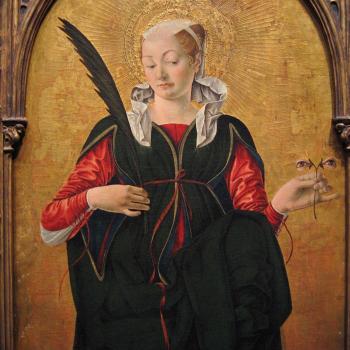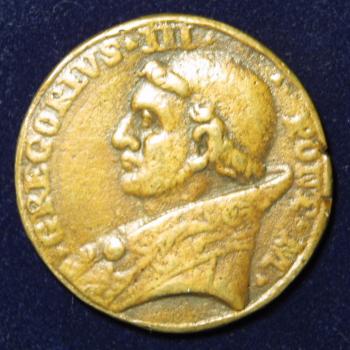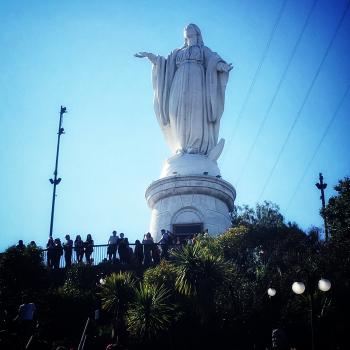
On the Feast of St. Anthony of Padua, I can’t help reflect on the saint who has proven so important to me. See, I am always losing things. Call it inattentive ADHD, call it the age of distraction, call it my academic inclinations, but I lose something on a daily basis. I cannot tell you how many times I have lost my keys/wallet/debit card/sun glasses/myself.
Once, I got lost driving my friends to my house from college (oh hi gents). Another time, I meant to go to the beach with my friend David, and we ended up in the mountains wandering along a highway. And don’t even get me started about trying to find my friends John and Holly’s house. Another time, I lost my baptism medal, a gold Sacred Heart of Jesus, only to have it fall out of my Nicomachean Ethics book in class. Needless to say, Saint Anthony has proved to be one of the more helpful saints I’ve gotten to know since converting.
It’s easy to lose things. You forget where you put it, you don’t put it in the right place, you don’t pay attention and suddenly it isn’t there any more. The widow who tore up her house looking for a coin? I’ve reenacted that scene with my debit card one too many times to understand it as “only a story.” But the truth is, everyone has lost something somewhere at sometime. Losing stuff, ultimately, isn’t the end of the world, except from the fervency of my prayers when this happens, St. Anthony might be wondering.
However, stuff isn’t the only thing we can lose.
We lose friends, we lose interest, we lose our way, we lose our minds, we lose ourselves, we lose grace, we lose hope, we lose faith, we lose charity. We even call death a loss. This points to something we rarely bring up nowadays when we talk about evil: the aspect of loss, of lacking, that characterizes evil.
In a world of live tweets, stories, and instagram documentation of horrific events around the globe, it’s easy to become focused on the experience of evil, the horror that arises in response to an active atrocity. In the loudness of a bombing or the cries of horror that accompany a mass shooting, we have a panoramic and stereoscopic clarity regarding the sheer cacophony of action that sin, evil, executes in the world around us. In all the jarring horror, it’s easy to miss the “silence of things that are lacking.” To say that evil is a lack seems an almost intentional understatement. To say the horrific fallout of sin is “loss” seems to whitewash the reality.
And yet, in losing the language of loss, perhaps we have lost some of the point about evil terms like “loss” and “lack” meant to convey.
St. Thomas Aquinas gives a helpful synthesis of the language of privation to describe evil when he notes in De Malo (q. 1, a. 1. ad 2) that:
Good and evil are properly speaking opposed to each other as are the possession and privation of a quality, since, as Simplicius says in his Commentary on the Categories, we properly call things contraries if both of them are in accord with nature (e.g., hot and cold, white and black). But things of which one is in accord with nature, and the other a departure from nature, are opposed as possession and privation of a quality,* not, properly speaking, as contraries.
And there are two kinds of privation: one, indeed, that consists in the privation of existing (e.g., death and blindness), and one that consists in the process inducing privation (e.g., sickness, which is a process inducing death, and ophthalmia, which is a process inducing blindness).
And we sometimes call the latter kind of privations contraries, since they still retain part of that of which they are being deprived, and it is in this way that we call evil a contrary, since it remains partially good and is not deprived of all good.
The idea with the language of lack, or privation, is that evil is identified not as some existing thing out there, a “dark side,” or duality of the desirable things around us. Rather, the idea is that evil is what we call the lacking that occurs when something which should be present no longer is.
We call a character like the Joker “evil” not because he has something different from what the normal person has (as if we all face the choice to be a citizen or a psychopathic super villain)but because he lacks a fundamental quality of human beings (e.g. a desire to partake in friendship and communal life). . In a similar way, we identify death as “evil” because death is the disunion, the lack of union, of our soul and body, the union which is an existing human person. In these cases something which should be there is not.
If we grant that things should be a certain way, that keys should be in our purse, that wallets should be in our pockets, that we should be at the right building, that we should be able to make decisions that make us happy, that love and friendship shouldn’t involve losing the other we love and are friends with, then we are implicitly assuming a right way of things. We assume an order that plays out, and when it does not, we know the failure because of the intended goal that wasn’t reached.
It’s easy for me to say I’m the sort of person who loses things.
It’s easy to act as if it is mere chance whether my keys are on their hook or in the middle of the ocean. And while yes, sometimes unbeknownst to me, another may rearrange my stuff, more often it is not random that my keys are lost, but rather due to my own failure to place them in their spot. The order of my keys having a spot is what I mean when I know they are lost: they were supposed to be here and yet they are not.
Likewise, this sense of how things should be, this idea of order, is why it can be helpful to speak of evil as a loss. If evil is an alternative thing, if all of human life hangs on the edge of either chaos or happiness, and there is nothing but mere chance and random forces to determine one or the other, we see evil as incomprehensible. When, however, we understand that evil is a loss from how things should be, and when we see that humans should act one way, and when they do not, they fall away from the right way of being human, the experience becomes comprehensible. Yet, with that comprehension, there is also the notion of agency. If we can understand how something should be, and that goal is within our abilities, we have a certain responsibility to work to realize that goal.
In particular, this is the case when we talk about losing faith.
People talk about losing their faith like losing their keys: something misplaced by sheer chance.Yet, its worth asking whether that loss was simply random chance, gremlins, or if perhaps we could have acted a bit differently and avoided the whole mess.
We have to remember that yes, faith is a virtue that exceeds our own abilities: faith requires the activity of the Holy Spirit, which is why it is called a theological virtue. Yet, though faith depends on God, it also depends on us. We have to cooperate, to dispose ourselves to that grace. But, we all too often take that part for granted: if God wanted me to be Catholic, how could I resist Him?
Now, that is, technically, true. As St. Augustine said, “You called, and cried aloud, and forced open my deafness. You gleamed and shone, and chased away my blindness.” We cannot generate faith, only God can. However, grace is a gift, and once we have the gift of faith, it really is ours. I didn’t birth myself, but having been born, my life really is my own. Likewise, once we have been given the Holy Spirit in baptism, who has given us the gift of faith, there are things we can do to cultivate or lose that faith. As St. Anthony himself noted in a homily,
Faith involves utterance and action. If I do what I say, and take hold of what I touch, there is faith, and such faith saves me.
Faith is found in our words:
Words of confession admitting our sins, words of profession reminding us what we do believe, words of prayer humbling ourselves before God and asking our good Father for more of we cannot bring about in ourselves on our own. The words of faith point us to God, they bring us to encounter the reality of His Divine Trinity. When we lack this, when we lose our practices of confession, profession, and prayer, we have fallen away from the words which orient us to the God Whom we desire to know and love. We have walked away from the relationship. This isn’t to take doubts flippantly, but to ask us to consider deeply: have I refused to speak out, have I lost the words that help kindle my flame of faith?
Faith is also found in our actions:
Simply speaking, we must do the work of God, not the works of the flesh. As St. Paul teaches (Gal. 5:19-21), the works of the flesh are “immorality, impurity, licentiousness, idolatry, sorcery, hartreds, rivalry, jealousy, outbursts of fury, acts of selfishness, dissensions, factions, occasions of envy, drinking bouts, orgies, and the like.” Now, I haven’t thankfully cast any spells of late, but I certainly see things on this list I have done, and things I have done more prominently in the moments I have most struggled to find my faith. The more we avoid those works, the more we clear out the junk in our lives that is hiding our faith.
On the other hand, the more we pursue the activities the Spirit encourages us to do, acts of “love, joy, peace, patience, kindness, generosity, faithfulness, gentleness, self-control (Gal. 5:22-23), the more we dispose ourselves to find our faith. If we pray, attend Mass, contemplate, give our time, treasure and talent, humble ourselves, practice self-control to avoid our instinctive, sometimes sinful, reactions, the more we allow the Divine light room to shine and help us find that faith we think we have lost. This is because, in part, these actions help us fight the loss of how we wish our faith was by reordering us back to God, helping us to pursue that faith we once had.
Granted, no crisis of faith is as simple as all that.
Each of you have your own particular circumstances, challenges, and crosses. Nor do I mean to suggest these ideas as guarantees you will immediately find your struggles alleviated, though I wish I could.
However, I have lost a lot of things in my life, and while it’s certainly always not my fault, I know there are things I could have done, things that are lacking in my organization and discipline, challenges that involve being far more intentional and thoughtful about my actions if I’m to avoid those moments of crisis when I’m late and my keys are gone. And the truth is, often times I am a cause, if not the cause, of my own struggles, and there are steps I could take to lessen the struggle of never finding what I want. I suspect this part of the analogy holds in the life of faith as well, if we are honest with ourselves.
When I do lose my keys, even when it’s my own darn fault, I have one more recourse. I turn to St. Anthony, and ask him to help me find them. This too, I think, holds in the comparison—in those moments you feel your faith might be most lost, perhaps you might try turning to St. Anthony, and asking him to help you find it.
St. Anthony of Padua, Pray for us who have recourse to you.
Picture via pexels.com
* It might be helpful to note here Ed Feser’s point [Edward Feser, “In Defense of the Perverted Faculty Argument,” in Neo-Scholastic Essays, (St. Augustine Press, 2015), pp. 378-415.] that:
“Natural” for the Aristotelian-Thomistic philosopher does not mean merely “deeply ingrained,” “in accordance with the laws of physics,” “having a genetic basis,” or any other of the readings that a nonteleological view of nature might allow. It has instead to do with the final causes inherent in a thing by virtue of its essence, and which it possesses whether or not it ever realizes them or consciously wants to realize them.












